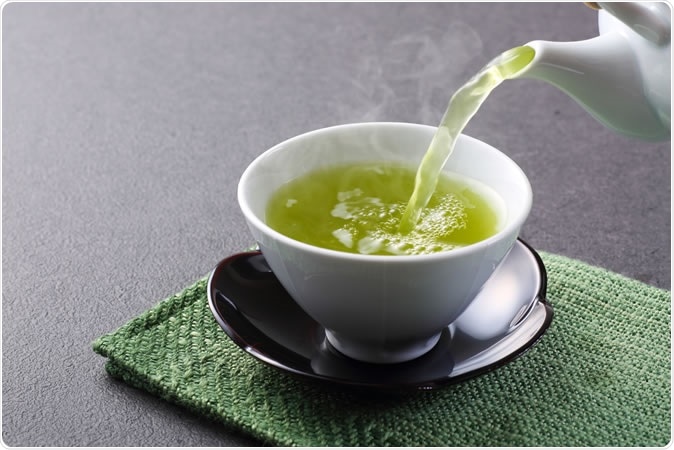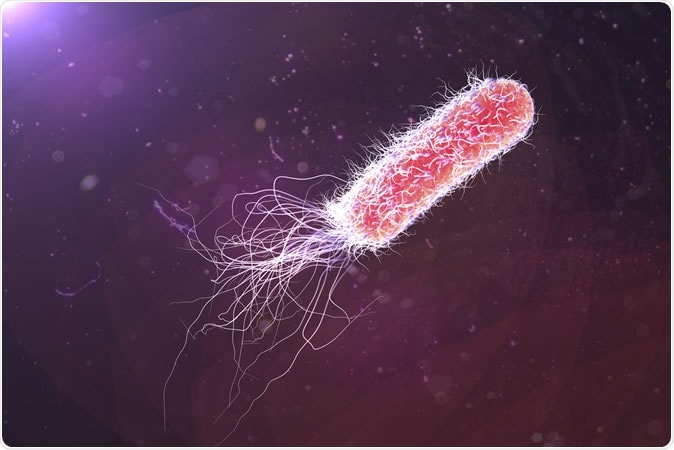Green tea has gained immense popularity across the globe, mainly because of its health benefits. Green tea extract has been used for many purposes – for weight loss, improved brain function, enhanced metabolism, and lower risk of some types of cancer, among others.

Green tea - Image Credit: taa22 / Shutterstock
Now, another health benefit has been added to the multitude of abilities green tea extract possesses. A team of researchers at the University of Surrey has found that a natural antioxidant, called epigallocatechin (EGCG), which is commonly found in green tea can help fight antibiotic-resistant bacteria.
The study, which was published in the Journal of Medical Microbiology, is perhaps the answer to the worldwide threat from drug-resistant superbugs. The advent of multidrug resistance among bacteria and other pathogens is imperiling the worth of antimicrobials, particularly antibiotics. Mostly, antibiotic resistance stems from the misuse of these agents.
The incidence of multidrug resistance is increasing by the minute. The World Health Organization (WHO) reports that in 2016, about 490,000 people developed multi-drug resistant tuberculosis infection across the globe.
In the United States, at least 2 million people get an antibiotic-resistant infection, and at least 23,000 people die, according to the Centers for Disease Control and Prevention (CDC).
"Antimicrobial resistance (AMR) is a serious threat to global public health. Without effective antibiotics, the success of medical treatments will be compromised. We urgently need to develop novel antibiotics in the fight against AMR. Natural products such as EGCG, used in combination with currently licensed antibiotics, may be a way of improving their effectiveness and clinically useful lifespan,” Lead author Dr. Jonathan Betts, Senior Research Fellow in the School of Veterinary Medicine at the University of Surrey, said.
What is Epigallocatechin (EGCG)?
The researchers aim to evaluate the ability of epigallocatechin (EGCG) to restore the activity of aztreonam, an antibiotic commonly used to treat infections caused by strains of Pseudomonas aeruginosa.

Bacterium Pseudomonas aeruginosa, antibiotic-resistant nosocomial bacterium. Illustration shows polar location of flagella and presence of pili on the bacterial surface - Illustration Credit: Kateryna Kon / Shutterstock
P. aeruginosa is a bacterial linked to the serious respiratory tract and blood infections. Over the past years, it has evolved to become drug-resistant, causing serious complications and even death.
In the experiments, the researchers mixed epigallocatechin (EGCG) with the antibiotic. They found that the combination is up to 31 percent more effective in killing pathogenic bacteria than the antibiotic alone.
Epigallocatechin (EGCG) is a type of catechin or a natural phenol antioxidant. It is commonly found in tea leaves, plums, apple skin, and onions. It has gained immense popularity for its uniqueness and potential positive impact on health. It is thought to aid in weight loss, prevent inflammation, prevent heart disease, reduce the risk of brain disease, and stem infections.
The antibacterial ability of EGCG
To test the efficacy of the compound when combined with aztreonam, the team performed in vitro tests to study how the combination affects the bacteria. They tested both individual measurements and in combination. They found that when they combined EGCG with aztreonam, the combination was more effective at eradicating bacterial numbers than either agent alone.
The researchers suggest that in the bacteria, EGCG may aid the increased intake of aztreonam, by promoting permeability in the bacteria.
"The World Health Organisation has listed antibiotic-resistant Pseudomonas aeruginosa as a critical threat to human health. We have shown that we can successfully eliminate such threats with the use of natural products, in combination with antibiotics already in use. Further development of these alternatives to antibiotics may allow them to be used in clinical settings in the future,” Professor Roberto La Ragione, Head of the Department of Pathology and Infectious Diseases in the School of Veterinary Medicine at the University of Surrey, said in a statement.
The discovery could open the door for the formulation of new drugs, antibiotics at that, to help curb multidrug-resistant antibiotic resistance. Aside from being effective, the potent compound is natural and can be found anywhere, in fruits, plants, and herbs.
Journal reference:
Betts, J., Hornsey, M., Higgins, P., Lucassen, K., Wille, J., Salguero, F., Seifert, La Ragione, R. (2019). Restoring the activity of the antibiotic aztreonam using the polyphenol epigallocatechin gallate (EGCG) against multidrug-resistant clinical isolates of Pseudomonas aeruginosa. Journal of Medical Microbiology. https://www.microbiologyresearch.org/content/journal/jmm/10.1099/jmm.0.001060